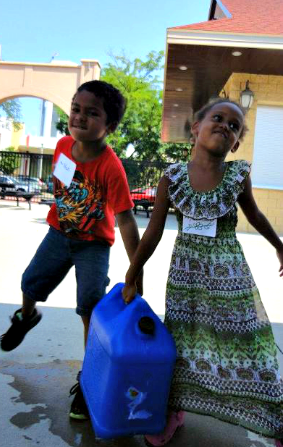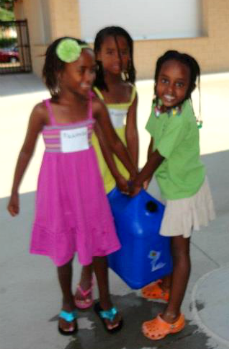Water to Thrive (W2T) was a leading sponsor of a Mehaber – or community gathering – held on the Minnesota State Fairgrounds (St. Paul, MN) on July 14, 2012. The host group, Ethiopian Kids Community, is a network of Minnesota adoptive parents whose children are from Ethiopia. The festive celebration of community featured all things Ethiopian – vendors of Ethiopian clothing, crafts, spices, coffee and typical Ethiopian foods; charities active in that region; and dance performances featuring children’s groups in native dress. W2T was pleased to contribute water for all, which was enthusiastically welcomed on this very hot day.

Our W2T booth was ably staffed by Minnesotans: (left to right) Water Angel Bill Kaemmerer, W2T Board member Carol Kaemmerer, and Ethiopian-born Water Ambassador Hermon Zeleke. Hermon’s sister Belene, who also assisted, is not pictured, as she was our designated photographer.
The W2T Ethiopian coffee was a huge seller and nearly every adopted child was sporting a blue W2T wrist band by the end of the day. But far more important than selling product was the opportunity to tell the story of why W2T partners with rural Ethiopian communities to make clean, safe, sustainable water available.


Children had a go at lifting Hermon’s blue jerry can, which, when full weighs about 50 pounds. I explained how in some villages, young girls and their mothers spent about 6 hours a day to bring water to their household in jerry cans like this one – heavy work! And that the water they labor to bring home is not fit to drink and makes the people sick. We talked to families about what a well could mean to a community in terms of reduced infant mortality and sickness, the ability for girls to attend school, and the ability of women to contribute to the economic health of their families by establishing small businesses with their new-found time. Bill told interested adults of the process W2T uses to engage the whole community in planning for a new well, including sanitation training, the building of a barricade to keep animals away from the well, and the formation of a water council to oversee the creation of the well and ensure its ongoing maintenance.
In Minnesota, the Land of Ten-Thousand Lakes, it is hard to imagine a parched land where water is scarce and the few sources of water that exist are polluted. But on such a hot day, it was easy to recognize the importance of water in everyone’s life. We were pleased to be able to share the W2T vision: “A world where we share generously to provide health, hope, and water to all.”
Water to Thrive (W2T) was a leading sponsor of a Mehaber – or community gathering – held on the Minnesota State Fairgrounds (St. Paul, MN) on July 14, 2012. The host group, Ethiopian Kids Community, is a network of Minnesota adoptive parents whose children are from Ethiopia. The festive celebration of community featured all things Ethiopian – vendors of Ethiopian clothing, crafts, spices, coffee and typical Ethiopian foods; charities active in that region; and dance performances featuring children’s groups in native dress. W2T was pleased to contribute water for all, which was enthusiastically welcomed on this very hot day.

Our W2T booth was ably staffed by Minnesotans: (left to right) Water Angel Bill Kaemmerer, W2T Board member Carol Kaemmerer, and Ethiopian-born Water Ambassador Hermon Zeleke. Hermon’s sister Belene, who also assisted, is not pictured, as she was our designated photographer.
The W2T Ethiopian coffee was a huge seller and nearly every adopted child was sporting a blue W2T wrist band by the end of the day. But far more important than selling product was the opportunity to tell the story of why W2T partners with rural Ethiopian communities to make clean, safe, sustainable water available.


Children had a go at lifting Hermon’s blue jerry can, which, when full weighs about 50 pounds. I explained how in some villages, young girls and their mothers spent about 6 hours a day to bring water to their household in jerry cans like this one – heavy work! And that the water they labor to bring home is not fit to drink and makes the people sick. We talked to families about what a well could mean to a community in terms of reduced infant mortality and sickness, the ability for girls to attend school, and the ability of women to contribute to the economic health of their families by establishing small businesses with their new-found time. Bill told interested adults of the process W2T uses to engage the whole community in planning for a new well, including sanitation training, the building of a barricade to keep animals away from the well, and the formation of a water council to oversee the creation of the well and ensure its ongoing maintenance.
In Minnesota, the Land of Ten-Thousand Lakes, it is hard to imagine a parched land where water is scarce and the few sources of water that exist are polluted. But on such a hot day, it was easy to recognize the importance of water in everyone’s life. We were pleased to be able to share the W2T vision: “A world where we share generously to provide health, hope, and water to all.”

About The Author: Meredith
More posts by Meredith